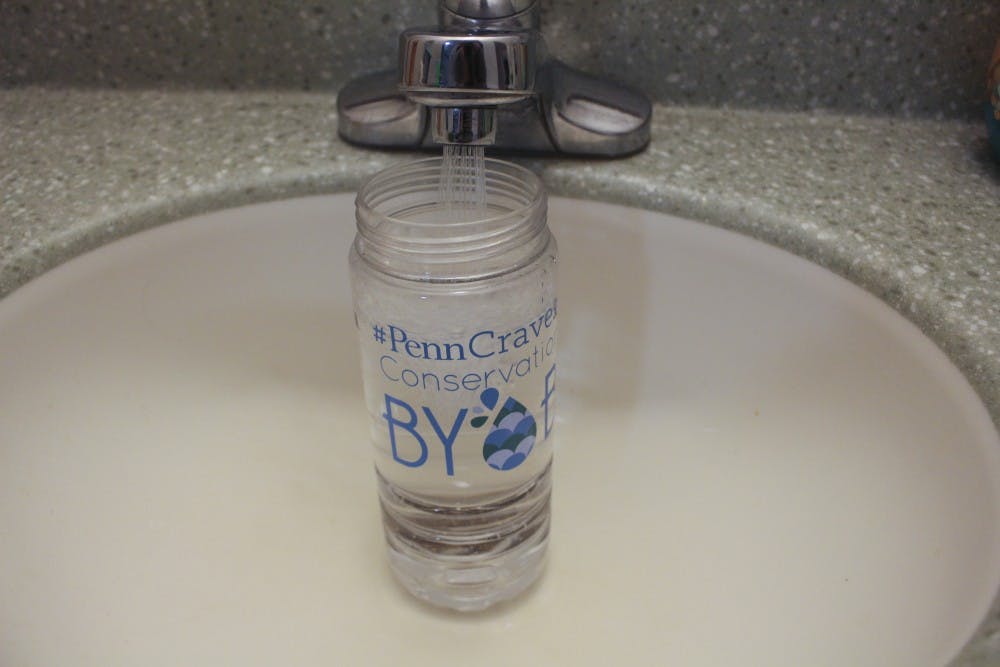
Anxiety over water quality on campus can make some students opt for alternatives to the tap.
“I don’t drink from the tap, and I actually make a point to not drink from the tap water,” College freshman Ally Schoenberg said. “Some of my friends definitely do drink from the tap and I always tell them not to.”
For Schoenberg, the concern is largely about tap water’s link to cancer. These worries aren’t entirely baseless — in September, higher-than-recommended levels of the cancer-causing carcinogen chromium-6 were found in Philadelphia tap water. For other students, the concern ranges from the water ”[looking] like milk” — which is likely due to air bubbles in the water — to rumors that it has traces of fluoride in it or iron remnants from potential corrosion in the pipes.
* * *
Penn does not test its own water on a regular basis. Instead, tests are conducted in specific areas when a student complains, Executive Director of Environmental Health and Radiation Safety Matthew Finucane said.
“We rely on the City of Philadelphia to test the water that they supply to the campus,” Finucane said.
The City of Philadelphia is responsible for testing the sources of drinking water, which Philadelphia Water Department spokesperson Laura Copeland said is “clean and safe to drink,” but problems with the drinking water could arise from the old pipes and brass faucets, according to Pennsylvania’s Department of Environmental Protection website.
Finucane said Penn’s drinking water comes from copper pipes and that most of Penn’s buildings “have been renovated over the years, so we don’t really have any situations where we might have lead fittings on the lines.”
Pennsylvania’s DEP website states, however, that “even legally ‘lead-free’ plumbing may contain up to 8 percent lead,” and that “corrosion of copper pipes in homes is the leading source of copper in drinking water.” Exposure to copper can cause adverse health effects, including vomiting and diarrhea.
In the last year, Finucane said there were “a few times” where students raised concerns about the quality of water, but he wasn’t sure of the exact number. In at least two instances, they subsequently tested the water in the residential buildings and received normal results, despite the tap running blue water in one case.
“[The number is] a little higher than usual,” he said. “Normally we don’t hear anybody with concerns about the water.”
Finucane attributed this increase in student complaints to the media coverage of the water crisis in Flint, Mich.
“There was just general concern, I imagine,” Finucane said, “that people had been reading the press about Flint, Michigan and were concerned perhaps that the same conditions existed here on campus.”
* * *
Some Penn students said they don’t think the tap water seems completely clean, but they drink it because of convenience and cost.
Having lived in Philadelphia his whole life, College junior Peter Beik said he is accustomed to the tap water by now even though he said he knows “it’s not the cleanest.”
“I’ve considered using a filtered bottle, but that’s also a lot of time,” Beik said. “Generally when I’m thirsty, I want to drink water. So I just kind of get it out of the sink, as opposed to preparing for being thirsty later.”
In response to student demand for alternative water sources, Director of Residential Services John Eckhart has been installing automatic water-bottle-filling stations in residential houses across campus over the past three years. Eckhart just confirmed that filling stations will be installed in Stouffer College House this summer, leaving Du Bois College House as the only residential hall at Penn without a filling station.
Eckhart said that for students, filling stations are a “convenience” and a “price-cut,” noting that many students now bring water bottles everywhere with them and filling stations facilitate an easier and cheaper alternative to purchasing a new bottle every day.
“I also think people like doing it there instead of the bathroom sink,” Eckhart said. “It just feels cleaner, just mentally, to use a water bottle refilling station because it’s dedicated for that use.”
The water bottle filling system still uses the Philadelphia tap water and shares the water source and pipes with the water fountains and sinks to which it is often attached.
Other options include a delivery system of water bottles, which can be ordered through Penn Student Agencies or directly at Quaker Corner and quench systems, which uses bottled water instead of the Philadelphia tap water.
The Daily Pennsylvanian is an independent, student-run newspaper. Please consider making a donation to support the coverage that shapes the University. Your generosity ensures a future of strong journalism at Penn.
Donate




